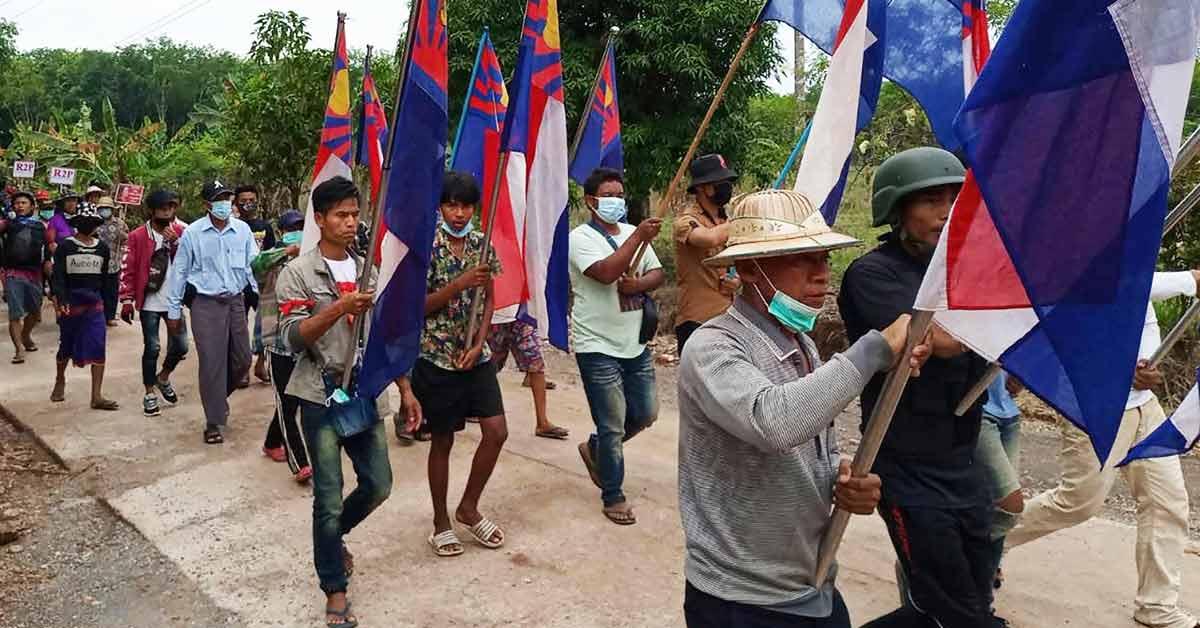Since 1 February, when the Myanmar military carried out a coup against the country’s civilian government, protests, strikes and other forms of civil disobedience have been taking place across the country. In response, the army, also known as the Tatmadaw, has deployed brutal force to suppress dissent, killing over 600 people, at least 46 of them children.
Since late March, there have been repeated aerial bombings in Karen state, resulting in roughly 19 people killed, more than 40 injured and thousands displaced. The Tatmadaw has also escalated military activities in Kachin state and increased violence towards civilians in Karenni state. Fighting has also displaced more than 1,000 people and killed civilians in Shan State.
Growing solidarity is emerging between the various ethnic groups, which have been victimised by the Myanmar military for decades and make up almost a third of the population, and the Bamar majority and ethnic peoples who are in the streets struggling against the coup. This certainly has worried the military leadership and may explain the increased aggression.
In seeking to resolve the situation in Myanmar and bring back civilian rule, the international community should not repeat its past mistakes. It should understand that the country has never been a unified nation and acknowledge the aspirations of the different ethnic groups within its borders.
A Disunited Nation
The foundation for Myanmar’s longstanding ethnic conflicts was laid during British colonisation, which began in 1824. British colonisers imposed racial categories and hierarchies of favour to divide and rule the population. During World War II, ethnic groups, such as the Karen, fought on the side of the British against the Burmese, hoping to get in return an independent state.
After the British left in 1948, the Karen and other ethnic groups continued their struggle for self-determination and to this day they refuse the imposed vision of a Burmese nation. There have been movements of autonomy or independence among numerous groups which have manifested in dozens of ethnic armies and parties.
Of the many conflicts these aspirations have resulted in, the struggle of the Karen National Union (KNU) for autonomy is widely considered one of the world’s longest-running conflicts. In 2015, the KNU signed the multilateral Nationwide Ceasefire Agreement (NCA) along with several other ethnic armed organisations and became involved in the Myanmar Peace Process. But this has not resolved tensions. The Myanmar military has continued to expand army bases and roads through Karen territories in violation of ceasefire agreements, provoking frequent armed clashes with the KNU.
The lack of understanding within the international community and media towards the ethno-national dynamics in Myanmar was made apparent when in 2017, just two years after the start of the peace process, the army undertook a massive ethnic cleansing campaign against the Rohingya people in Rakhine state. The massacres, sexual violence and mass expulsions of civilians shocked the world, and so did opposition leader Aung San Suu Kyi’s decision to defend the genocidal actions of the army.
Myanmar is better understood not as a cohesive nation, but as a territory forced together by the iron grip of the military, fraying at its edges. The ethnic armed groups which are clashing with the army are not just “rebels”, but in many cases de facto governing bodies in parts of the country long abandoned by the central authorities. The people living in these territories understand themselves as citizens of independent, sovereign states.
Anti-Coup Resistance
The one unifying factor among the diverse peoples in the country has been the oppressive decades-long rule of the military. In the wake of the recent coup, these groups are increasingly united in their opposition to the military junta, if coming from different perspectives.
They are beginning to communicate across their differences more than ever before. This is despite reservations among ethnic nationalities who share a pervasive sense of betrayal by Suu Kyi and her party.
Could this be the moment of genesis for a shared political imaginary – one rooted in something other than cultural hegemony by the dominant Bamar ethnic group? The ferocity with which the Myanmar military is responding to this newfound inter-ethnic solidarity suggests this may be happening.
Protests against military rule, including the far-reaching Civil Disobedience Movement, continue across the country despite the brutal crackdown. It is increasingly clear that this moment is about much more than simply the release and reinstatement of Suu Kyi and other detained NLD party members.
In Yangon and Mandalay, ethnically diverse cities with a Bamar majority wearing red headbands and carrying images of Suu Kyi mixed with ethnic nationality flags and traditional dress, as well as signs bearing messages such as, “Myanmar Military Stop Stealing Indigenous Lands” are demanding federal democracy.
Fervent calls from many protesters have resulted in the Committee Representing Pyidaungsu Hluttaw (CRPH), the country’s parallel civilian government, announcing plans to abolish the 2008 constitution which enshrined the army’s control of the government. This represents a major turning point for the county. For many ethnic activists in particular, it represents a moment that many have worked for their entire lives.
Inter-ethnic solidarity in the protest movement has also moved the country much closer towards federal democracy than could have been imagined only a few months ago. Now even members of the Bamar majority are increasingly contending with the reality of being part of a diverse, multi-ethnic political entity. This emerging multi-ethnic coalition is a constituency united primarily by decades of exhausting life, and death, under the boot of the Tatmadaw. – Al Jazeera
Related Articles:
